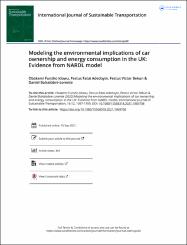| dc.contributor.author | Idowu, Obakemi Funsho | |
| dc.contributor.author | Adedoyin, Festus Fatai | |
| dc.contributor.author | Bekun, Festus Victor | |
| dc.contributor.author | Balsalobre-Lorente, Daniel | |
| dc.date.accessioned | 2023-08-05T19:17:44Z | |
| dc.date.available | 2023-08-05T19:17:44Z | |
| dc.date.issued | 2022 | en_US |
| dc.identifier.issn | 1556-8318 | |
| dc.identifier.issn | 1556-8334 | |
| dc.identifier.uri | https://hdl.handle.net/11363/5173 | |
| dc.description.abstract | We investigated the asymmetric effects of energy consumption, car ownership and tourism activities on CO2 emissions in the UK. Empirical results from the Non-Linear Autoregressive Distributed
Lag (NARDL) model reveal that in the UK, only car ownership has asymmetric effects on emissions
with a magnitude of 1.428% (positive) and 10.108% (negative) shocks that highlight the impact
of car ownership on emission level in UK while rising energy consumption and GDP have symmetric positive impacts on emissions, and tourism has a negative impact on emissions. Furthermore,
on causality analysis, we found a unidirectional causality runs from GDP per capita to car ownership, and that car ownership and tourism both causes energy consumption in a one-way relationship. Apart from encouraging environmentally friendly energy sources to reduce carbon emission
in the UK, the short and long-run analyses disclose that economic expansion and energy consumption increase carbon emission. Empirical results also offer a new perspective on the ascending relevance of electric cars in UK. Hence, only policies that discourage the use of carbon
emission inputs in the process of production should be encouraged. Electric vehicles seem to be
more efficient when compared to combustion engines because most energy put in the battery is
used to drive the cars and wastes less energy when they are driven in cities. This can be achieved
by increasing tariffs and decreasing quotas on internal combustion-powered cars. Subsequently,
promote and increase usage of electric vehicles that reduce greenhouses. | en_US |
| dc.language.iso | eng | en_US |
| dc.publisher | TAYLOR & FRANCIS INC, 530 WALNUT STREET, STE 850, PHILADELPHIA, PA 19106 | en_US |
| dc.relation.isversionof | 10.1080/15568318.2021.1969708 | en_US |
| dc.rights | info:eu-repo/semantics/openAccess | en_US |
| dc.rights | Attribution-NonCommercial-NoDerivs 3.0 United States | * |
| dc.rights.uri | http://creativecommons.org/licenses/by-nc-nd/3.0/us/ | * |
| dc.subject | Car ownership | en_US |
| dc.subject | economic growth | en_US |
| dc.subject | energy consumption | en_US |
| dc.subject | pollutant emission | en_US |
| dc.subject | tourist arrivals | en_US |
| dc.subject | UK | en_US |
| dc.title | Modeling the environmental implications of car ownership and energy consumption in the UK: Evidence from NARDL model | en_US |
| dc.type | article | en_US |
| dc.relation.ispartof | International Journal of Sustainable Transportation | en_US |
| dc.department | İktisadi İdari ve Sosyal Bilimler Fakültesi | en_US |
| dc.authorid | https://orcid.org/0000-0002-6099-7899 | en_US |
| dc.identifier.volume | 16 | en_US |
| dc.identifier.issue | 12 | en_US |
| dc.identifier.startpage | 1097 | en_US |
| dc.identifier.endpage | 1109 | en_US |
| dc.relation.publicationcategory | Makale - Uluslararası Hakemli Dergi - Kurum Öğretim Elemanı | en_US |
| dc.contributor.institutionauthor | Bekun, Festus Victor | |



















